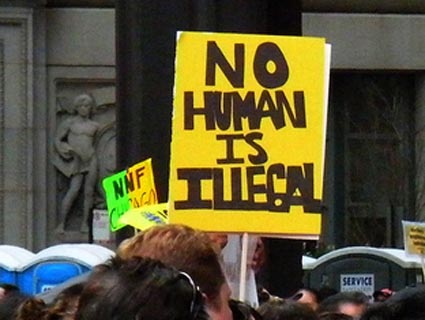The LA Times reports that the Senate’s Gang of Eight—or whatever they’re calling themselves—has agreed on a plan for comprehensive immigration reform:
A bipartisan group of senators has agreed on a plan to grant legal status to most of the estimated 11 million illegal immigrants in the U.S….In terms of the number of people who would potentially receive legal status, it would be more than three times larger than the amnesty plan passed under President Reagan in 1986, which legalized about 3 million immigrants.
….The Senate proposal would allow most of those in the country illegally to obtain probationary legal status immediately by paying a fine and back taxes and passing a background check. That would make them eligible to work and live in the U.S. They could earn a green card — permanent residency — after the government certifies that the U.S.-Mexican border has become secure, but might face a lengthy process before becoming citizens.
….Less-controversial provisions would tighten requirements on employers to check the immigration status of new workers; increase the number of visas for high-skilled jobs; provide green cards automatically to people who
earn master’s degrees or PhDs in science, technology or math at U.S. universities; and create an agricultural guest-worker program.
The four Republican senators who have agreed to this framework are John McCain, Lindsey Graham, Mike Lee, and Jeff Flake. It’s not clear how much clout these guys have with the rest of the Republican caucus, or how much clout Senate Republicans have with House Republicans. Still, as I mentioned last month, I wouldn’t be surprised if the fiscal cliff and immigration reform are the sole exceptions to an all-obstruction-all-the-time strategy from House Republicans. They might not like it, but a sheer sense of self-preservation suggests that the GOP’s best strategy is to pass something fairly quickly so that they can get immigration off the table as a political issue as soon as possible. Once that’s done, they can at least get started on the task of mending their ruinously suicidal relationship with the Latino community.
On Tuesday, President Obama will unveil a competing immigration plan. After that the real haggling starts.
And on a political note, it’s worth mentioning that Obama has probably played this issue about as well as he could have. His generally tough-minded approach toward immigration enforcement hasn’t been popular on the left, but the unfortunate truth is that comprehensive reform was probably impossible until the flow of illegal immigrants was slowed down substantially. Tougher enforcement—which included building the fence, beefing up border patrols, pushing ahead with E-Verify, and escalating the number of deportations—has worked alongside a weak economy to slow illegal immigration to a crawl over the past four years, and this has steadily whittled away at the appeal of the immigration table pounders. Combine this with a Republican Party that desperately needs to stanch its bleeding among the fastest growing ethnic group in the country, and you finally have, for the first time in decades, a political climate that just might make immigration reform possible. But I doubt that this moment will last very long. This probably needs to happen in the next six months if it’s going to happen at all.










